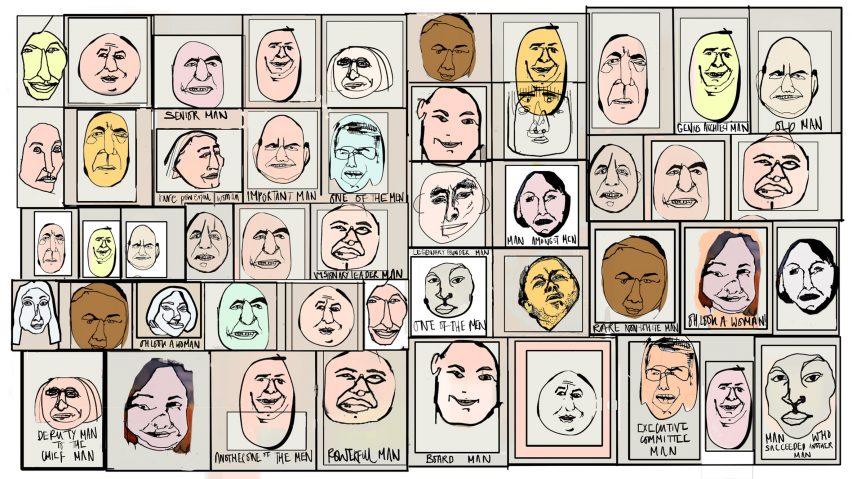Dezeen has teamed up with the Royal Institute of British Architects to present a free evening event on Tuesday 6 March about improving gender diversity in architecture.
The event, which welcomes both men and women, takes place at RIBA headquarters in central London. Taking place two days before International Women's Day, it will include a presentation on why a more diverse workforce is good for business.
RIBA organised the event in response to Dezeen's 2017 survey that revealed a "shocking" lack of diversity at senior management levels in the world's biggest architecture firms.
"Like many others in the industry, we were stunned to read the results of the Dezeen survey on the lack of gender diversity in top architecture practices," said RIBA talks curator Meneesha Kellay.
"This is something we all have a responsibility to keep highlighting, and to make the industry aware of its shortcomings."
Free event will explore how diversity improves business
Dezeen's survey revealed that just three of the world's 100 biggest architecture firms are headed by women, while only two have management teams that are more than 50 per cent female.
It also found that women occupy just 10 per cent of the highest-ranking jobs at the world's leading architecture firms, while 16 firms have no women at all in senior positions.
"It's clear that executive leadership in architectural firms are not doing enough to address the disparity," Kellay said.
The event, titled Must do Better: Improving Gender Diversity in Architecture, will feature talks by Alexandra Hagen, CEO of White Arkitekter and Helen Taylor, director of practice at Scott Brownrigg.
Dr Sundiatu Dixon-Fyle, who leads on inclusion and diversity at McKinsey & Company, will present research on the link between diversity and business success. There will also be workshops where attendees can share ideas and suggestions.
"Architectural firms are not doing enough"
Dezeen spoke to event organiser Meneesha Kellay about why she programmed the event and what RIBA is doing to improve diversity:
Dezeen: Why are you organising this event?
Meneesha Kellay: Like many others in the industry, we were stunned to read the results of the Dezeen survey on the lack of gender diversity in top architecture practices, this is something we all have a responsibility to keep highlighting and to make the industry aware of its shortcomings.
Dezeen: Are men invited?
Meneesha Kellay: The event is aimed at both men and women as it takes everyone within a company to bring about real change. In fact, everyone benefits from an inclusive workplace. Architects may not be aware that diversity is good for both productivity and profitability.
We'll be showing research on the link between diversity and financial performance with a focus on the business case for inclusion and diversity.
We especially hope practice directors who can impact a change will attend. There will be an opportunity to review current succession and career development plans and we’ll be putting forward practical examples and takeaways of how practices can integrate gender equality as a key part of their business strategy.
We'd love to see big practices participate as it will signal to industry that practice leaders really care about gender diversity and are not just making empty platitudes.
Dezeen: Are architecture firms doing enough to increase diversity?
Meneesha Kellay: It's clear that executive leadership in architectural firms are not doing enough to address the disparity, so we decided to look beyond the profession for guidance which is why we've asked McKinsey & Company to share their research on poor representation of women in senior positions, and their in-depth study on how gender and ethnic diversity in the workplace actually correlates to profitability.
Dezeen: What is RIBA doing to improve gender balance in the profession?
Meneesha Kellay: The RIBA is committed to playing its part in driving change and eradicating inequality. We have a range of initiatives to encourage and showcase best practice including mentoring resources to support female staff including a Women into Leadership event and the nationwide roll-out of our mentor training launched last year.
Our Practice Role Models project shines a light on exemplar practices and our Employment and Equality, Diversity and Inclusion policies commit RIBA Chartered Practices to providing non-discriminatory and inclusive working environments, upheld by our Code of Practice, complaints procedure and sanctions.
Equally, for our cultural or public programming, we take care in ensuring to feature work and talent of both emerging and established names within our programmes and to provide a platform for men and women to speak at our events.
Dezeen: Architecture conferences often have very male-heavy speaker lineups. What is RIBA doing about that?
Meneesha Kellay: We have a strict policy of never programming all-male panel discussions, and we carefully monitor both our audiences and who we invite to speak and commission for exhibitions. The greater focus on diversity of speakers and contributors has enabled us to attract a much more diverse audience.
For instance, in the last three years, we have seen our 'White-British' demographics for exhibitions decrease, from 92 per cent in 2014 to an average of 70 per cent in 2016 and 2017.
Must do Better: Improving Gender Diversity in Architecture takes place at RIBA, 66 Portland Place, London W1B 1AD, from 7:00pm to 8:30pm on Tuesday 6 March.
Tickets for the event are FREE and can be booked here.

